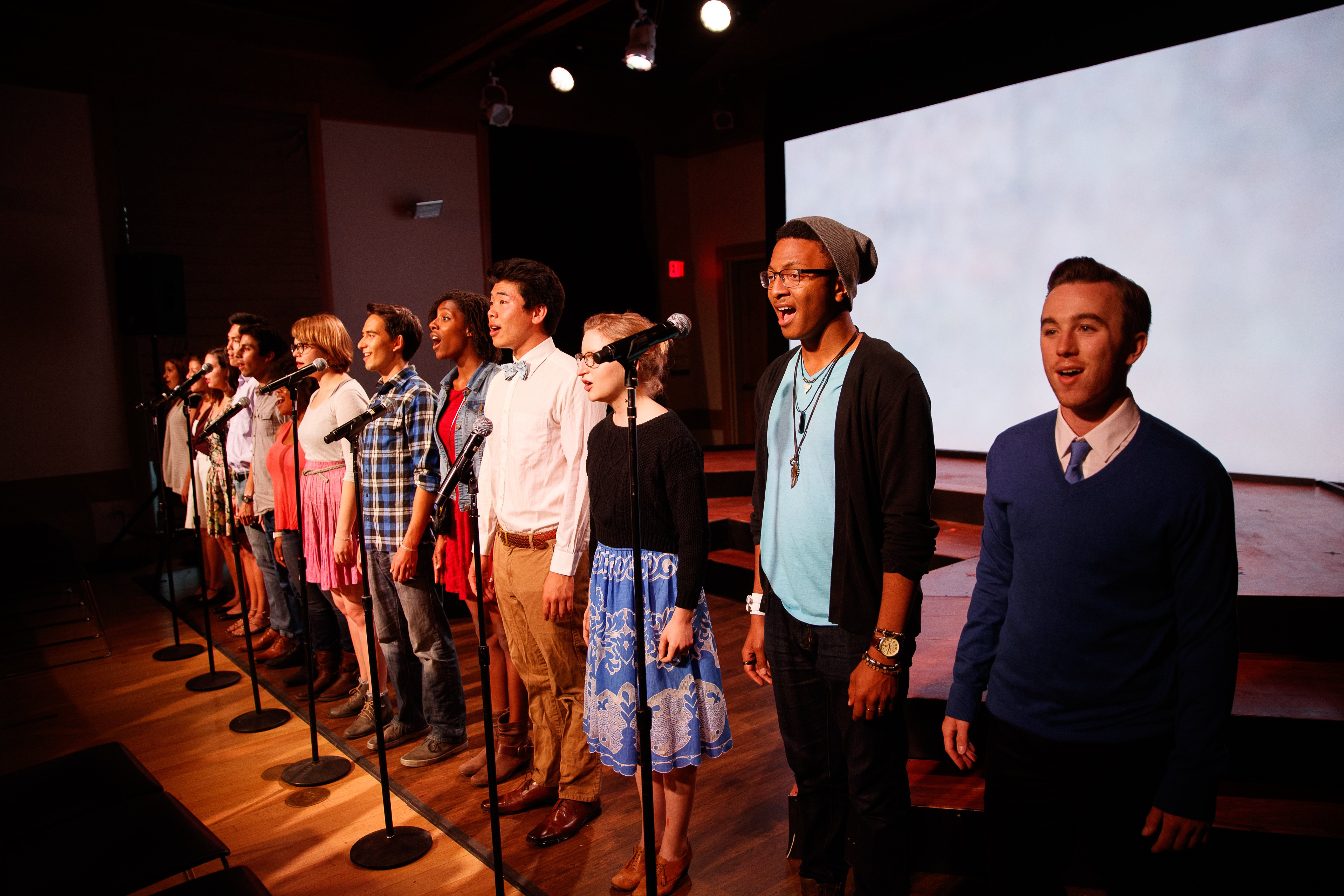Last week, Ram’s Head Theatrical Society launched its fourth (and final) show of the year: Neil Bartram and Brian Hill’s new musical “The Theory of Relativity” – which, through a collection of songs, monologues, and interludes, tells the story of a group of interconnected people searching for love. Beginning with a crash course in physics and ending with more long-term lessons on the nature of love and loss, the show chronicles the romantic lives of thirteen college-aged kids as they float in and out of relationships, navigate friendships, and struggle to find acceptance on the rocky path to adulthood.
In a refreshing break from the company’s more traditional production style, the show is modestly staged; the blinding lights and blaring sounds of Memorial Auditorium are swapped out for the more intimate setting of Elliott Program Center, where a few rows of chairs are all that separate audience members from the action. Under the direction of Alexander Ronneburg ‘17, the show is executed with a gentle simplicity which suits the nature of its straight-forward narrative. The entire ensemble is onstage for the duration of the performance, perching on chairs and steps as they listen to each number. Behind them, a looming screen changes from blue, to pink, to yellow as each person shares their story – projecting onto the audience a mood for every occasion.
Though the proximity of the space certainly lends itself to the prospect of forging poignant audience-performer connections, many of the show’s peculiar staging choices ultimately prevent this aim from being realized. Transitions from piece to piece lack the fluidity necessary to keep the narrative moving, and – coupled with a lingering applause following each song – make aspects of the show feel stilted and drawn out. The screen, ripe with dramatic possibility, never lives up to its creative potential, and is used in ways which assist the emotional arc of the story but effectively ignore opportunities to incorporate more compelling imagery throughout. While some numbers are brilliantly orchestrated, given fresh life by the use of backup singers, accompanying musicians, and ensemble choreography, this use of space is often inconsistent – leaving other, less active moments of the show feeling listless.
Such an effect is unfortunately amplified by the quality of the script itself, which, transparently written by two middle-aged white men, feels at best repetitive and at worst shamelessly pedantic. Many of the anecdotes are fairly generic, detailing problems which – though often cute and witty – fail to arrive at any realization of depth. The incorporation of scientific jargon into the score feels forced at certain points, never failing to remind its viewers that we are the sum of heat, light, energy, and the inexorable trajectories of different vectors – all embarking on the same journey as we hurdle together through space. Indeed, there were several moments where I found myself longing to toss a wrench into such a flawless narrative.
The exception to this trend lies – as it so often does – in the story of Jenny, who meets her dismal fate working behind the counter of a Dairy Queen, becoming too overweight to find a happy ending of her own. Though the problematic effects of such blatant fat-shaming are partially dulled by the casting of a thin actress in the role, the number sheds an ugly light on the rest of the performance – reminding us that while love can be quirky and unpredictable, it is very much only worth putting on stage when it is manifested in bodies which conform to an oppressive politics of desirability.
Despite this, the caliber of each performer is impressive. A small band (led by Hugo Kitano ‘17) sits to the side of the main stage, consisting of two guitarists, a drummer, and a pianist – all of whom create a sound musical dynamic with the rest of the ensemble. Justine DeSilva’s ‘16 performance as a high-strung woman attempting to overcome her acute germaphobia to win the girl of her dreams is heart-warming and believable, down to the comically sincere glisten in her eyes as the describes the horror of imagining where her lover’s hands may have been.
In perhaps the cutest number of the show, Preston Lim and Paul Gregg, both ‘17, sing a song entitled “Apples & Oranges,” in which their love for “oranges” emerges as a thinly veiled metaphor for homosexuality – an angle on the subject which is revitalizing in its ability to discuss queer romance without succumbing to a one-dimensional narrative of heartbreak and trauma. Samantha Williams ‘17 and Clarissa Carter ‘19 are similarly dynamic – with powerful voices and engaging performances destined to occupy larger stages, both within and beyond Stanford. Also worth mentioning are the moving solo performances of Tess McCarthy ‘16, Holly Dayton ‘17, Cayla Pettinato ‘18, who nearly burst at the seams with the momentum of their talent.
Though “The Theory of Relativity” touches upon some poignant issues, at the end of the night it proves hasty in its handling of more delicate themes – presenting us with an array of stories which are sweet and entertaining, but rarely relatable. Supported by a strong cast and crew, the show represents Ram’s Head Theatrical Society’s ongoing effort to push the boundaries of musical theater and create work which is intimate, subtle, and captivating – and is, in this sense, a testament to the many possibilities which exist in the world of pen and stage.
Contact Madelaine Bixler at mbixler ‘at’ stanford.edu.
